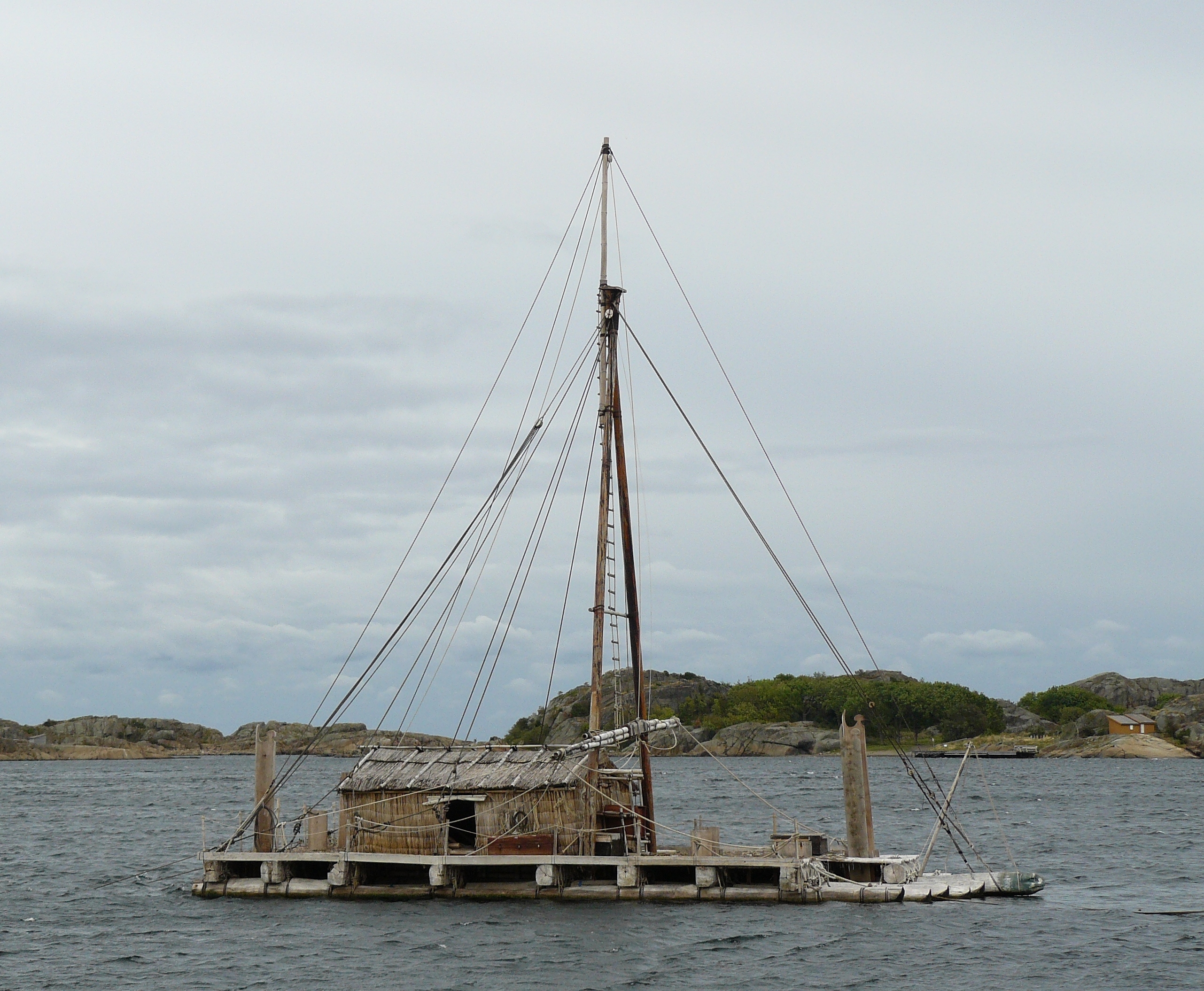|
FreudianSlippers posted:All I know is that they mostly sailed along the coast and no one deliberately sailed out to open high seas until the iron age. That is a simplification, but it is accurate. The most impressive bronze age sailing we have evidence for (IMHO) is the tin trade between the Mediterranean and the British isles. Through Gibraltar, across the bay of Biscay, the Channel, in the same age as the pyramids. It would be fair to say that was "along the coast", but it would have been an incredible risk to the ones trying it. Then you have the Phoenicians exploring here and there, I'm guessing someone definitely "deliberately sailed out to open high seas" as you say in that age, only they didn't know it was the open high seas and nobody ever heard from them again. If you look at vikings discovering America, they didn't set out to deliberately cross the open high seas in one go, but stepped from one settlement to the next. Leif Eriksson started from Greenland, not Norway, according to the saga. Isolated, it's more impressive to sail from Norway to Greenland, than from Greenland to Newfoundland. But the trip from Norway to Greenland wasn't isolated, it was following a pattern of accumulated travel knowledge via Shetland, Faroes and Iceland, you could almost say "along the coast". Perhaps a few others tried west, but didn't live to tell the tale? Point is, ship technology follows after explorations, it doesn't lead to explorations. It's hare brained exploration which leads to discovery which leads to people going "holy poo poo let's build loving amazing boats". You can cross the Atlantic in a hollowed out tree trunk. That is, you'll probably fail, but if enough people try someone will make it sooner or later. Once you learn what is to be gained by crossing, you will be incentivized for a tree trunk Kennedy moon shot technology leap. There's plenty of evidence that humans have crossed tough seas with technology simpler than bronze age, but they probably did so at very high risk.
|
|
|
|

|
| # ? May 26, 2024 14:40 |
|
cheetah7071 posted:I'm actually interested about any bronze age boat knowledge you have, thanks for the links! Not much, I'm just a dilettante. But that find is beyond anything else of the era because it sank so deep into waters without oxygen or woodeating bugs, there is usually no wood left because they sailed near the coast, sunk in the shallows and only the stony bits survive, amphoras, ballast and anchors. There are many known bronze age shipwrecks identified by just the type of ballast or cargo. The type of copper ingot that looks like an animal skin with one "leg" in each is corner is very typical of peak bronze age trade has been found in British shallows in reasonable places for them to dock, which is just mind blowing. cheetah7071 posted:The context is just sort of a vague idea that many things were invented much later that I was originally aware of--things like how the saddle was a surprisingly late development. That train of thought led me to wonder if there's any core concepts of how boats work that were still relatively new in the classical era, which is the earliest period I know anything about Good question. I don't know how to answer it, but I can add a simpler one. I saw a Pompeian dresser, torched black, with cupboard doors and a drawer. Who knows when the wooden drawer was invented? Anyone born after 79 AD knows exactly how to use a drawer, it's so self evident it makes you wonder how far back it reaches. You can think the same with boats. A boat has to be waterproof, that works with paleolithic log boats or neolithic skin boats. But it seems like there are no big steps from there, just gradual ones. We know for instance that the English channel was definitely crossed with neolithic skin boats, it was probably routine to them but I would like a lot of TV money and life vests to try it.
|
|
|
|
One thing I was able to glean just from googling "bronze age boats" which seems obvious in retrospect, is that the planks weren't held together with nails. They were held together, at least in Britain which has some of the best-preserved examples, with "withys", a kind of willow stem used to lash them together
|
|
|
|
Ola posted:A boat has to be waterproof, that works with paleolithic log boats or neolithic skin boats. But it seems like there are no big steps from there, just gradual ones. We know for instance that the English channel was definitely crossed with neolithic skin boats, it was probably routine to them but I would like a lot of TV money and life vests to try it. The Ark was probably more similar to a coracle than to an all-wooden ship. https://www.youtube.com/watch?v=s_fkpZSnz2I
|
|
|
|
cheetah7071 posted:One thing I was able to glean just from googling "bronze age boats" which seems obvious in retrospect, is that the planks weren't held together with nails. They were held together, at least in Britain which has some of the best-preserved examples, with "withys", a kind of willow stem used to lash them together Off the coast of south America they were sailing on a kind of raft made from famously buoyant balsa wood and with large simple sails. This Norwegian vessel is i believe supposed to be modeled on these, although idk how authentic it is: 
|
|
|
|
How were ancient and medieval villages arranged? I always have this idea in my head of farmers living out away from the main cluster of houses somewhere in the middle of the fields they tended, and then the village proper would be mainly the specialists who don't need a lot of space to do their thing and communal things like temples or churches so they can all be maximally accessible to the rest of the village. But I guess my mental picture is probably more from the modern world where farms are much bigger and everybody has the luxury of motor vehicles, and even in the 19th century the average farmer would still have more access to an okay horse than they would in the 9th or -3rd. Would all the villagers live relatively close together in an area that could be walled off and then the fields they tend would surround the whole village? Would farmland be walled off? Would they even possibly all live together in one big building? How common would houses out on their own in the middle of nowhere be? Ola posted:Point is, ship technology follows after explorations, it doesn't lead to explorations. It's hare brained exploration which leads to discovery which leads to people going "holy poo poo let's build loving amazing boats". You can cross the Atlantic in a hollowed out tree trunk. That is, you'll probably fail, but if enough people try someone will make it sooner or later. Once you learn what is to be gained by crossing, you will be incentivized for a tree trunk Kennedy moon shot technology leap. There's plenty of evidence that humans have crossed tough seas with technology simpler than bronze age, but they probably did so at very high risk. Didn't work out for Mali.
|
|
|
|
SlothfulCobra posted:Would all the villagers live relatively close together in an area that could be walled off and then the fields they tend would surround the whole village? Would farmland be walled off? Would they even possibly all live together in one big building? How common would houses out on their own in the middle of nowhere be? Don't know about Europe, but in south Asia all village structures are clustered together. The village I grew up in Nepal all the houses were within a stones throw away from each other and the fields were a distance from the houses. Since labor/tools/draught animals are shared communally (planting, ploughing, reaping) no one needs to be next to their land directly. The only structures outside the village itself used to be religious structures and shelter sheds for when you were wintering or grazing animals and needed to stay at the location. Infact, in the case of Nepal outcasts or lowercaste groups would set up shop nearby the villages but never allowed into the village proper. So you had blacksmiths, grave diggers, leather workers living outside the village proper. Things had not changed a lot from the past for us when I was growing up at least.
|
|
|
|
FreudianSlippers posted:All I know is that they mostly sailed along the coast and no one deliberately sailed out to open high seas until the iron age. Maybe in Europe. Most of the south Pacific Ocean was settled by people who didn't work metal.
|
|
|
|
SlothfulCobra posted:How were ancient and medieval villages arranged? I always have this idea in my head of farmers living out away from the main cluster of houses somewhere in the middle of the fields they tended, and then the village proper would be mainly the specialists who don't need a lot of space to do their thing and communal things like temples or churches so they can all be maximally accessible to the rest of the village. It might be different elsewhere, but in English manor villages, in the middle ages, village houses were clustered together, with the fields on the outskirts. In the morning, the villagers would walk to the fields and in the evening, walk home. Here's an illustration of a "typical" manor village. https://wwnorton.com/college/history/ralph/resource/manor.htm
|
|
|
|
SlothfulCobra posted:How were ancient and medieval villages arranged? I always have this idea in my head of farmers living out away from the main cluster of houses somewhere in the middle of the fields they tended, and then the village proper would be mainly the specialists who don't need a lot of space to do their thing and communal things like temples or churches so they can all be maximally accessible to the rest of the village. There are a lot of different settlement types, e.g., see the list at the bottom of this article.
|
|
|
|
You can see around Britain many examples of different farming and village set ups but small village of clustered homes and communal buildings in various guises always seems to be the baseline. If nothing else shared security and community is a huge benefit that apparently outweighs the walk to your farmland. You can also see, especially in places like Wales and the Peak district the dry stone walls that fence in grazing land for sheep and cows. Many of these have been in place separating fields and land boundaries since before recorded history.
|
|
|
|
 pot
|
|
|
|
Wikipedia has the Olmec and the Maya on a couple of lists of bronze age civilizations. Am I correct in thinking neither group made bronze?
|
|
|
|
Weka posted:Wikipedia has the Olmec and the Maya on a couple of lists of bronze age civilizations. Am I correct in thinking neither group made bronze? The Maya did, but the Olmec were way, way before bronze. No American civilization used metal in any extensive utilitarian way though. They could make bronze, but I wouldn't use the term "bronze age" since the ages are based on what material is being used for tools, and the Americans never used metal as a primary material for tools.
|
|
|
|
Weka posted:Wikipedia has the Olmec and the Maya on a couple of lists of bronze age civilizations. Am I correct in thinking neither group made bronze? The olmecs predated most american metallurgy, however the americas did work with copper and copper-alloys from around 600 AD.
|
|
|
|
ughhhh posted:Don't know about Europe, but in south Asia all village structures are clustered together. The village I grew up in Nepal all the houses were within a stones throw away from each other and the fields were a distance from the houses. Since labor/tools/draught animals are shared communally (planting, ploughing, reaping) no one needs to be next to their land directly. The only structures outside the village itself used to be religious structures and shelter sheds for when you were wintering or grazing animals and needed to stay at the location. Infact, in the case of Nepal outcasts or lowercaste groups would set up shop nearby the villages but never allowed into the village proper. So you had blacksmiths, grave diggers, leather workers living outside the village proper. Things had not changed a lot from the past for us when I was growing up at least. it always struck me as odd the way blacksmiths get labelled as outcast in so many cultures. i mean its a skilled and necessary trade, nobody's gonna drive all the blacksmiths out and keep them out. Were they kinda itinerant in your village, did they move around from place to place?
|
|
|
|
I really wonder if it's because a blacksmith would just be hella annoying to live next to. All that hammering.
|
|
|
|
There's a lot of folklore about blacksmiths making deals with the devil sometimes even managing to get the upper hand against old scratch.
|
|
|
|
The olmecs are cool because they loved jade, and in addition to more common nephrite they even had the rarer kind of jade (jadeite) likely from deposits in modern Guatemala. It has an unusual blue color and I just got a big chunk of it. In terms of working jadeite they were thousands of tears ahead of China (though of course China was working nephrite jade from a very early period).
|
|
|
|
Squalid posted:it always struck me as odd the way blacksmiths get labelled as outcast in so many cultures. i mean its a skilled and necessary trade, nobody's gonna drive all the blacksmiths out and keep them out. Were they kinda itinerant in your village, did they move around from place to place? They moved around and never stayed in one place. They were called Kami which in Nepali language could also be translated to "worker". Some theories that they were of northern Indian origin that were displaced and thus relegated to outsider status in the communities they settled in. I think similar concept could be applied to Jews in europe working in usury as a process in finding a niche in a hostile community, or Roma/traveler people being known to work fixing roads. Today we can also see it in the US with notions of Indians working convenience stores or Koreans running laundromats etc. I think it has less to do with the labor preformed, but how well the work can be preformed while being excluded from social/legal needs such as owning land or religious obligations. ughhhh fucked around with this message at 22:59 on Aug 13, 2020 |
|
|
|
Squalid posted:it always struck me as odd the way blacksmiths get labelled as outcast in so many cultures. i mean its a skilled and necessary trade, nobody's gonna drive all the blacksmiths out and keep them out. Were they kinda itinerant in your village, did they move around from place to place? They were like wizards. They could start with a hunk of rock and turn it into a near-magical substance no one could obtain otherwise. The way the iron seemed to appear out of thin air and the way they could manipulate it was awesome and intimidating. Blacksmiths were both revered and feared.
|
|
|
|
ughhhh posted:They moved around and never stayed in one place. They were called Kami which in Nepali language could also be translated to "worker". Some theories that they were of northern Indian origin that were displaced and thus relegated to outsider status in the communities they settled in. man nobody ever likes travelers. Whether they're blacksmiths or horse traders like romani or fruit pickers like undocumented immigrants in the USA they always make a good scapegoat.
|
|
|
|
Grand Fromage posted:They could make bronze, but I wouldn't use the term "bronze age" since the ages are based on what material is being used for tools, and the Americans never used metal as a primary material for tools. I don't think that's a fair way of applying the Bronze Age, there are surely loads of places where it wasn't the primary material for tools perhaps ever. East Asia I know for sure; bronze was limited enough that bronze was mostly just a thing for the aristocracy, and peasants continued to use mostly stone/bone/wood tools until the Iron Age, and even a few centuries into it in most places. I dunno the proportion in other places but I expect societies where everyone used all bronze all the time were in by far the minority, at least for a number of centuries past what we would conventionally term as the start of their Bronze Ages.
|
|
|
|
What sort of metal objects, particularly bronze ones, were Americans making? E: clarity Weka fucked around with this message at 00:16 on Aug 14, 2020 |
|
|
|
Koramei posted:I don't think that's a fair way of applying the Bronze Age, there are surely loads of places where it wasn't the primary material for tools perhaps ever. East Asia I know for sure; bronze was limited enough that bronze was mostly just a thing for the aristocracy, and peasants continued to use mostly stone/bone/wood tools until the Iron Age, and even a few centuries into it in most places. I dunno the proportion in other places but I expect societies where everyone used all bronze all the time were in by far the minority, at least for a number of centuries past what we would conventionally term as the start of their Bronze Ages. Well, if you're just using bronze age for any culture that has bronzemaking tech, then yeah, some Americans would qualify. I think the deeper problem is the stone/bronze/iron age system is from the Mediterranean and applying it elsewhere doesn't necessarily mean much. Weka posted:What sort of metal objects, particularly bronze ones, were Americans making? Jewelry, mostly. There are some occasional examples of metal tools but they're quite rare, metalworking in the Americas is mostly decorative. It raises an interesting question because some of the American cultures were clearly skilled at using metal by the decorative objects that we find, but for whatever reason they never really used it as a more practical technology, though they could have. Sort of like how the only wheels we find are in things like toys but were never used for vehicles. You can certainly do plenty with stone tools, and there are examples like obsidian edged weapons where the stone is in some ways superior to the metal (assuming you can afford to break your sword every time you use it). There is a question how this would have changed had the Europeans not showed up, because the big exception was the Inca had started using metal more widely. There are examples of Inca weapons and armor with bronze plates and tips. If they'd had another few hundred years of being left alone you could imagine that idea spreading out as people came into contact with bronze helmets and realized the utility of it.
|
|
|
|
In Europe there's a bunch of folklore and stories about blacksmiths being the only ones that can make a deal with a devil and not be damned, usually because they either trick the devil somehow or just grab his nose with their pliers when he tries to come collect their soul.
|
|
|
|
FreudianSlippers posted:In Europe there's a bunch of folklore and stories about blacksmiths being the only ones that can make a deal with a devil and not be damned, usually because they . . . just grab his nose with their pliers when he tries to come collect their soul. I am kind of surprised the devil keeps falling for that, honestly.
|
|
|
|
Going by a lot of folklore he's not very bright. I mean he gets tricked into shrinking himself and going into a bottle/jar/hollowed sheep bone only for the person asking him to seal the container seemingly every other week.
|
|
|
|
Grand Fromage posted:I think the deeper problem is the stone/bronze/iron age system is from the Mediterranean and applying it elsewhere doesn't necessarily mean much. Yeah, for sure. There's a movement among some Chinese scholars to add a "Jade Age" which I suspect is half nationalistic since their Bronze Age starts significantly later than in the west, but on the other hand their society wasn't really defined by the metal in the same way for sure. quote:Sort of like how the only wheels we find are in things like toys but were never used for vehicles. I actually feel like the wheel has been way over-valued in our popular culture in some regards; for transportation and such it's actually not so useful in lots of situations. In both Korea and Japan because of mountainous terrain, wheels were pretty rare too; most stuff was just via palanquins or porters etc.
|
|
|
|
FreudianSlippers posted:Going by a lot of folklore he's not very bright. I'm under the impression that basically every minor pre-christian "mildly annoying spirit" got folded into Satan. Which leads to all the weird tonal inconsistencies where in one story he's practically a dualist deity practically equal to God, and in the next he's a woodland prankster who can be easily outmaneuvered as long as you keep your wits about you.
|
|
|
|
Milton kind of nuked any historical conception of satan. Itís all Milton now. Paradise lost is basically a book of the Bible
|
|
|
|
Koramei posted:Yeah, for sure. There's a movement among some Chinese scholars to add a "Jade Age" which I suspect is half nationalistic since their Bronze Age starts significantly later than in the west, but on the other hand their society wasn't really defined by the metal in the same way for sure. I wonder what utility a jade age has. I don't think the tool ages mean much even in the Mediterranean tbh. They're sort of convenient since there is really a discontinuity in the late Bronze Age and things are different, but unless you buy the chaos from switching to iron theory (which I do think has some legs) the bronze/iron dichotomy has nothing to do with that discontinuity. Koramei posted:I actually feel like the wheel has been way over-valued in our popular culture in some regards; for transportation and such it's actually not so useful in lots of situations. In both Korea and Japan because of mountainous terrain, wheels were pretty rare too; most stuff was just via palanquins or porters etc. Yeah, but there were terrains in the Americas where wheels would be useful, even without draft animals. I agree that it doesn't mean that Americans were bad at technology or whatever, real life isn't a Civilization tech tree, but it is interesting when you have a technology that is of great utility to some people and then none at all to others, and there isn't a clear reason why. I get why the Inca weren't going to be rolling carts around, but there were lots of people in non-mountainous terrain who probably could've made great use of wheelbarrows. E: There's also wheel-adjacent technologies like water mills that would've been useful to lots of American cultures. Grand Fromage fucked around with this message at 02:21 on Aug 14, 2020 |
|
|
|
galagazombie posted:I'm under the impression that basically every minor pre-christian "mildly annoying spirit" got folded into Satan. Which leads to all the weird tonal inconsistencies where in one story he's practically a dualist deity practically equal to God, and in the next he's a woodland prankster who can be easily outmaneuvered as long as you keep your wits about you. Eventually angels and demons end up as platonic essences as powers of being rather than as beings. Rather there is a conflict between treating them as platonic essences as powers of being vs as beings. Itís pretty early too even in Judaism before Christianity. But it really informs Origins cosmology (angels and demons as platonic essences)
|
|
|
|
Man all you history professors are gonna be able to instantly get kids to understand unreliable sources, "You know, like Michael Cohen's book."
|
|
|
|
Arglebargle III posted:Man all you history professors are gonna be able to instantly get kids to understand unreliable sources, "You know, like Michael Cohen's book." crap that reminds me I was supposed to graduate (from undergrad  ) almost a year ago now and not only has covid thrown that in the trash and consigned me to who knows how many dumbshit online courses, I still haven't learned anything. All I wanna do is actually teach history and french but how and where the gently caress do I get to the point that I can make good informative posts for less than minimum wage and not just shitpost half-remembered nonsense. I wanna be a broke alcoholic professor goddamit ) almost a year ago now and not only has covid thrown that in the trash and consigned me to who knows how many dumbshit online courses, I still haven't learned anything. All I wanna do is actually teach history and french but how and where the gently caress do I get to the point that I can make good informative posts for less than minimum wage and not just shitpost half-remembered nonsense. I wanna be a broke alcoholic professor goddamit
|
|
|
|
Edgar Allen Ho posted:I wanna be a broke alcoholic professor goddamit grad school: because two out of three ain't bad
|
|
|
|
Edgar Allen Ho posted:crap that reminds me I was supposed to graduate (from undergrad Teaching French history would be ideal, but you have to have a good head for it.
|
|
|
|
The latest 100% accurate historical simulation, Total War: Troy, is available for free todayFreudianSlippers posted:In Europe there's a bunch of folklore and stories about blacksmiths being the only ones that can make a deal with a devil and not be damned, usually because they either trick the devil somehow or just grab his nose with their pliers when he tries to come collect their soul. yeah they've traced one of those stories back 6000 years or so, it's the oldest folktale that they've dated so far and goes back to PIE Basically the smith meets a demon sitting on a big rock, who is like 'hey, I'll give you a wish in exchange for your soul or firstborn child or some poo poo'. And the smith is like 'sure, tell you what, give me the ability to permanently weld any objects together, that would be useful in my job'. The demon gives him the power, and says 'okay, now for you to hold up your side of the bargain', but the smith just sticks the demon to the rock and walks off.
|
|
|
|
FreudianSlippers posted:In Europe there's a bunch of folklore and stories about blacksmiths being the only ones that can make a deal with a devil and not be damned, usually because they either trick the devil somehow or just grab his nose with their pliers when he tries to come collect their soul. If you ever see what it takes to do blacksmithing, it already looks basically like playing with the fires of hell. Also rural peasants often suck and there's a lot of times where they lashed out against people who made their living doing something other than being a rural farmer. galagazombie posted:I'm under the impression that basically every minor pre-christian "mildly annoying spirit" got folded into Satan. Which leads to all the weird tonal inconsistencies where in one story he's practically a dualist deity practically equal to God, and in the next he's a woodland prankster who can be easily outmaneuvered as long as you keep your wits about you. Isn't the vast bulk about Satan usually stuff from outside of the bible anyways?
|
|
|
|

|
| # ? May 26, 2024 14:40 |
|
Mesoamericans had way more technological progress than Europeans: turning a bunch of bullshit grass into life-giving corn took thousands of years of careful progress and hard work.
|
|
|






















 Yes, it's like a lava lamp.
Yes, it's like a lava lamp.














